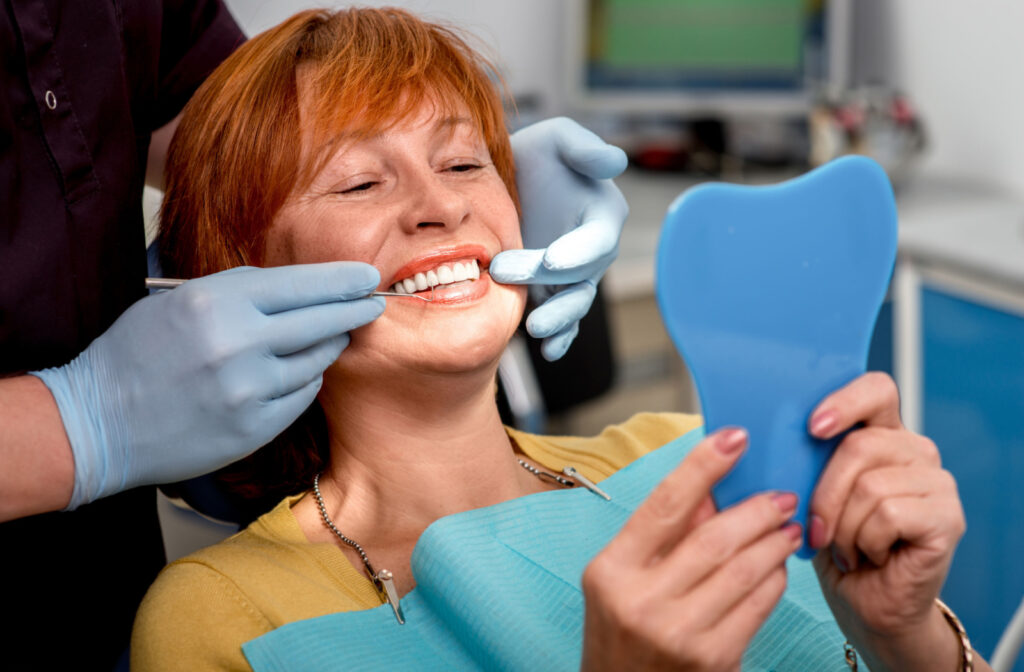A confident smile is a powerful tool, but receding gums can present challenges that affect your oral health. So, for those dealing with receding gums, the question arises: Can dentures be fitted to receding gums?
The answer is yes! Dentures can indeed be fitted to receding gums, although additional adjustments might be necessary in certain cases.
Understanding Receding Gums
Receding gums, or gingival recession, occur when the gum tissue surrounding the teeth pulls back, exposing more of the tooth or the tooth’s root.
Various factors contribute to this condition, including:
- Aggressive tooth brushing
- Gum disease
- Genetics
- Age-related changes
As gums recede, you may experience increased sensitivity, tooth decay, pain, and tooth loss.
If your gum recession is caused by gum disease, you’ll need treatment. Gum disease can be treated with scaling and root planing, antibiotics, or surgery.
How Dentures Work
Dentures are prosthetic devices that replace missing teeth. They’re custom-made to fit snugly and comfortably over the gums.
Dentures can be partial or complete. Partial dentures replace a few missing teeth, while complete dentures replace all the teeth in one or both jaws.
Dentures can be used by anyone, regardless of age, who experiences tooth loss.
Fitting Dentures to Receding Gums
Fitting dentures to receding gums can be challenging, as the gums may not provide enough support to keep the dentures in place, resulting in the need for adhesive or metal clasps to help keep the dentures in place.
Before fitting you with dentures, your dentist will take impressions of your mouth. If your gums are severely receded, your dentist may recommend gum grafting or implants to provide additional support for the dentures.
Types of Dentures
Partial Dentures for Specific Tooth Loss
Partial dentures are removable appliances that fill gaps caused by missing teeth, restoring functionality and aesthetics. If you have just lost 1 or 2 teeth, you can be fitted with single-tooth dentures to replace them, secured to your gums with a clasp.
However, If you have receding gums, this clasp may cause pain and irritation, even worsening the condition of your gums, causing them to recede more.
Complete Dentures
Complete dentures replace an entire arch of teeth. If your gum recession is significant, and you have lost or are on a trajectory of losing most or all of your teeth, you may need a complete set of dentures.
After removing your existing teeth, your dentist will construct a set of false teeth and fit it into your mouth.
Because complete dentures have no clasps or clips, you won’t have to worry about worsening your gum recession. However, you still need to clean them regularly.
Implant-Supported Dentures
In cases of extensive gum recession, traditional dentures may not provide enough stability.
Implant-supported dentures are secured by dental implants anchored in the jawbone, offering a more secure and stable alternative. These “snap-in dentures” are sturdier than traditional dentures and are less likely to become loose when speaking and eating.

Caring for Your Dentures
Regardless of the denture option you choose, maintaining your gum health and taking care of your dentures is paramount. Regular dental check-ups, good oral hygiene practices, and lifestyle adjustments can help preserve your existing gum tissue and prevent further recession.
You must also take care of your dentures to keep them in good shape:
- Clean your dentures daily: Brush your dentures with a soft-bristle brush and non-abrasive denture cleaner to remove food particles, stains, and bacteria. Avoid using regular toothpaste as it can be too abrasive.
- Handle them with care: When cleaning or removing your dentures, be careful not to drop them. Place a towel or basin of water in the sink to prevent breakage if they do slip out of your hands.
- Keep them moist when not in use: Dentures can become warped if they dry out. Soak them in a denture-cleaning solution or plain water overnight to keep them moist.
- Brush your gums, tongue, and palate: Even with dentures, it’s important to maintain good oral hygiene. Use a soft-bristle toothbrush to gently clean your gums, tongue, and palate before inserting your dentures.
Navigating Receding Gums with the Right Denture Choice
While you can still wear dentures with receding gums, you may need to go through a few extra steps beforehand, like treating gum disease or gum grafts.
Your dentist can help determine the best denture option for you. You may need partial, complete, or implant-supported dentures. Don’t let tooth loss and receding gums affect your quality of life. Contact your dentist at Marks Dentistry to explore your options.



